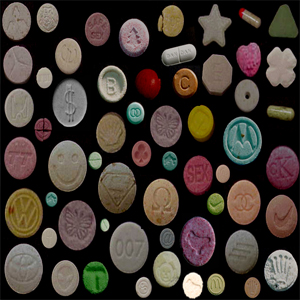
| |
| |
|
What is
ecstasy?
The chemical name for ecstasy is MDMA (methylene-dioxy
methylamphetamine). It is a derivative of amphetamine. The
ecstasy is a popular drug in recreational settings because its
effects, very challenging, allow users to enjoy for some time
without the effect falls.
|
| |
| |
Consumption
form :
There are several types of drugs
sold by the name of
"ecstasy",
taken orally, as capsules,
tablets, pills
in multiple forms and colours (MDA,
MBDB, MDEA, STP,), and with
different logos. That represents a
great danger for users, because it’s
impossible to know their
composition.They
Cocaine is mostly absorbed nasally
(sniff).
This genre of substances has
particularly known a big amount of
fans in these "rave parties".
Notice that everyday comes out new
types of synthetic drugs.
|
|
|
|
|
What
are
the
effects? |
|
Category :
Disruptive |
Caractéristics
:
Frequently used by
young people,
especially at "Rave
Parties", she has
the reputation
between users of
being harmless.
Yet that’s not true,
it’s associated to
our capacity of
resistance and is
reinforced by the
ingestion of alcohol
and use conditions
(excessive heat and
intense physique
activity -
dehydration). Use,
which tends to get
trivialized in young
people, even out of
these
"parties",
presents
danger
of
irremediable
brain
cell
damage,
sometimes
since
the
first
time. |
|
|
|
Effects
over the central nervous system:
By disturbing the action of the
Serotonine neurotransmitters, MDMA
brings the stimulating effects and
euphoric properties of amphetamines.
|
|
● |
|
Awakening and liveliness
state. |
|
● |
|
Diminution of the fatigue
sensation or accumulation of
non-aware fatigue, with the
consequent danger of going
beyond our physical
possibilities. |
|
● |
|
Self-confidence increase. |
|
● |
|
Well-being sensation,
happiness sensation.
At the beginning, ecstasy
makes easier the
communication and creates a
friendly surrounding but
also brings in a more or
less short term, according
to the individual, serious
perturbations and
dependence. |
|
|
|
|
| | |



